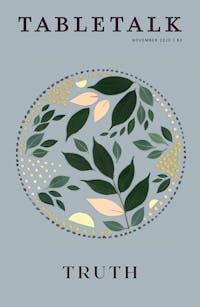
Request your free, three-month trial to Tabletalk magazine. You’ll receive the print issue monthly and gain immediate digital access to decades of archives. This trial is risk-free. No credit card required.
Try Tabletalk NowAlready receive Tabletalk magazine every month?
Verify your email address to gain unlimited access.
Mormons, Jehovah’s Witnesses, Christian Scientists—these and other non-Christian religions claim to accept the Bible as divine revelation, but they supplement it with additional revelatory texts or traditions that wind up taking precedence over Scriptural teaching. In other words, people are adding to God’s revelation of the Old and New Testaments. A mirror image of this phenomenon is people’s taking away from the books of the Bible. The early heretic Marcion is notorious for rejecting the Old Testament and many books of the New Testament and thus holding to only a portion of the New Testament as authoritative Scripture. Whether by addition or subtraction, the whole truth of God’s Word is compromised.
The Bible repeatedly warns us against this temptation: “You shall not add to the word that I command you, nor take from it” (Deut. 4:2; 12:32); “And if anyone takes away from the words of the book of this prophecy, God will take away his share in the tree of life and in the holy city, which are described in this book” (Rev. 22:19). Ecclesiastes says that the words of the wise are like goads given by the Shepherd (God) and warns, “My son, beware of anything beyond these” (12:12). The old saying “a place for everything, and everything in its place” is applicable here. Every biblical book has its rightful place in the canon of Scripture and contributes to the overall message, meaning that no passage is dispensable.
While biblically minded Christians confess this in theory, do they always embody it in practice? In reality, we can unintentionally fall into the same error as Marcion by functionally “taking away” from the words of Scripture. How so? By habitually focusing on only certain parts of the Bible and ignoring others. When we regularly skip past the extensive genealogies of 1 Chronicles 1–9, for example, or the detailed ritual instructions in Leviticus, we have, for all intents and purposes, become “mini Marcionites” who have cut out a part of Scripture. This is also the case when we avoid passages that challenge our theological perspectives such as the imprecatory psalms (which pray for God’s judgment on evildoers) or the profound discussions of God’s foreknowledge and predestination in Romans 9–11. Or, we may develop tunnel vision and focus all our attention on one particular area of the Bible’s teaching—doctrinal issues such as soteriology or eschatology, moral imperatives such as love for one’s neighbor, or liturgical issues of worship and music—and in the process we can lose sight of other biblical teachings that are equally vital.
When we fail to pay attention to the whole counsel of God in every part of Scripture, either for theological reasons or simply because of lack of interest, we are in practice “taking away” from God’s Word. Thankfully, over the years the church has developed effective means to counteract this phenomenon. The practice of lectio continua, or the systematic, expositional preaching of entire books of the Bible, is one of the best ways for preachers to resist the temptation to talk exclusively about the subjects that appeal to them personally. In addition, there are many plans for personal Bible reading, such as the famous one developed by Robert Murray M’Cheyne, that provide a guide for reading through the whole Bible, Old and New Testaments. The point of such a systematic reading plan is not to finish the Bible in six months, a year, or some other arbitrary deadline, but rather to make sure that you are actually reading or listening to the whole canon of Scripture.

Statistically speaking, roughly three-fourths of the Bible is made up of the Old Testament. This means that if we are going to have a “balanced diet” of Scripture, the Old Testament will need to receive a proportionally higher amount of our reading time. For some Christians, that will require an adjustment. Many of us are used to ordering that “special dish” when we go to our favorite restaurant: we know that it is delicious, so why should we risk ordering something else that we might not enjoy as much? That principle does not apply to the Bible, however: since every part of Scripture is God-breathed (2 Tim. 3:16), every time we open it we can “taste and see that the LORD is good” (Ps. 34:8). Let us delight in receiving “the whole counsel of God” in all the Scriptures.
